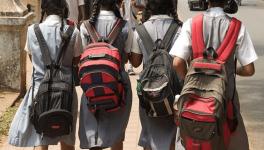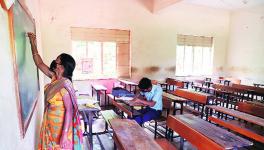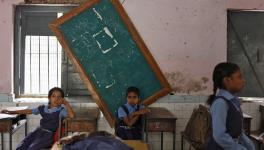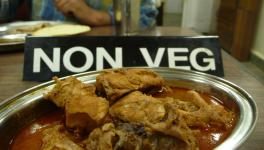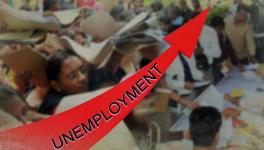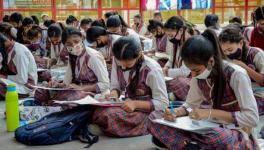UP: No Govt Funds for Mid-day Meals for over 3 Months, Headmasters Forced to Raise Money
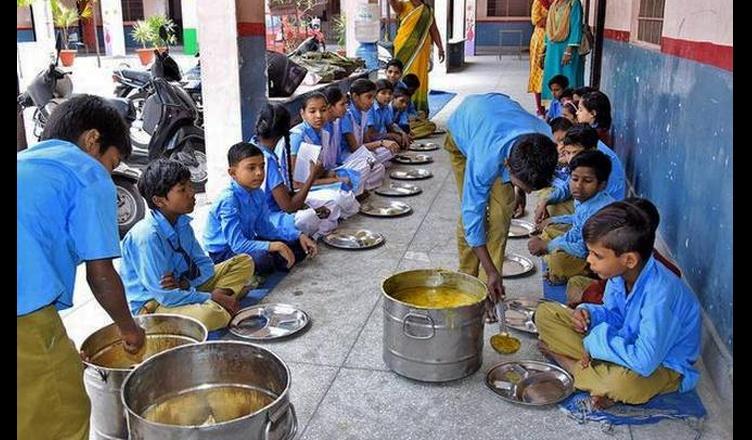
Image for representational purpose. Credit: Sabrang India
Lucknow: Government schools in Uttar Pradesh have reportedly not received any money for mid-day meals for the last three months, preventing some schools from serving food to children under the scheme. In a few schools, teachers and gram pradhan (village head) have been spending from their own pockets or buying rations on credit to feed the children. The Education Department has attributed the delay in payment to the non-release of funds by the Finance Department.
After getting a supply of wheat and rice from food procurement agencies, the schools typically receive compensation for the cooking costs at the rate of Rs 4.97 per student for primary classes and Rs 7.45 for upper primary classes from the state government. The amount is provided to procure ingredients such as pulses, vegetables, oil, salt, spices, turmeric and LPG. The amount of mid-day meals provided to the schools is according to the number of students. Under the national programme, 60% of the cooking cost is shared by the Centre and 40% by the state.
Ajay Singh, a teacher in a Sitapur district school alleged that the government has diverted the funds meant for the midday meal scheme towards some other activity. He claimed that over Rs 2.3 crore meant for the scheme in his district were knowingly diverted by the Bharatiya Janata Party government in the state towards other work.
"The Yogi government has been snatching food from children's mouths and spending money on its image building," a teacher said on the condition of anonymity. Teachers say they are buying food because the people who send their children to school are very poor. In Gonda district alone, the bills have piled up to Rs 2.7 crore.
In 412 schools in the Ghazipur district, a total of 34,7117 students are served meals under the scheme. The outstanding dues of these schools for the cooking costs are over Rs 2 crore in the district.
The village head of Ghazipur's Rajapur, Ashwani Rai, said that they have not received funds after the month of March for providing mid-day meals at his school. Due to this, all the food is being prepared for the children by taking loans from shopkeepers. However, he said that the Education Department has started streamlining things and the funds would be released to the schools in the coming days.
Meanwhile, the Education Department has attributed the delay in payment to the non-release of the funds by the state Finance Department. Sources in the School Education Department said the bills were submitted to the Finance Department in the last month itself, but the funds had not been released so far.
"This is not just a matter of one or two districts, but the situation is similar in all the government-run schools as every time the budget comes very late from the state. Funds for ingredients have been due for the past several months," Virendra Mishra, national spokesperson of Rashtriya Shaikshik Mahasangh (RSM), a national-level outfit of primary school teachers told NewsClick, adding that teachers were spending money from their pocket for the children.
When asked then how the schools manage to provide mid-day meals to the children, Mishra who is also a headmaster at a primary school in Gauriya Diha in the Gonda district, said, "The village head provides the mid-day meal ration from his own pocket or picking up rations on credit. But in most of the schools, the headmasters manage from their salary or collect funds from teachers as most of the children belong to marginalised backgrounds. We can not send them back empty stomach," he told NewsClick, adding that he draws money from his own salary to provide food to around 217 bonafide students enrolled in his school.
"On average, if 150 children are coming to the school, it cost around Rs 750 to Rs 800 per day for the midday meals. We have been forced to run the scheme from our own pockets, as Basic Education Department threatens to take disciplinary action against us if the scheme stop," he claimed.
Meanwhile, the parents of school-going kids said the authorities concerned should be more particular about the matter so that nutritious food can be provided to their wards and teachers didn’t have to be inconvenienced.
NO INCREASE IN CONVERSION COST AFTER 2020
The midday meal scheme was started in 2001 by the central government to enhance enrolment, retention, and attendance in government primary schools and simultaneously improve the nutritional status of the children. Under the scheme, a student from any government or government-aided primary school is to be served a meal with a minimum content of 300 calories of energy and 8-12 grams of protein a day for a minimum of 200 days.
It must be mentioned that the central government has not made an increment in the conversion cost under the National Program of Mid-Day Meal in Schools (NP-MDMS) since 2020. The revised rate of the cooking cost for the primary stage (class 1 to 5) is Rs 4.97 per child, and Rs 7.45 for upper primary (class 6 to 8), which was revised in 2018.
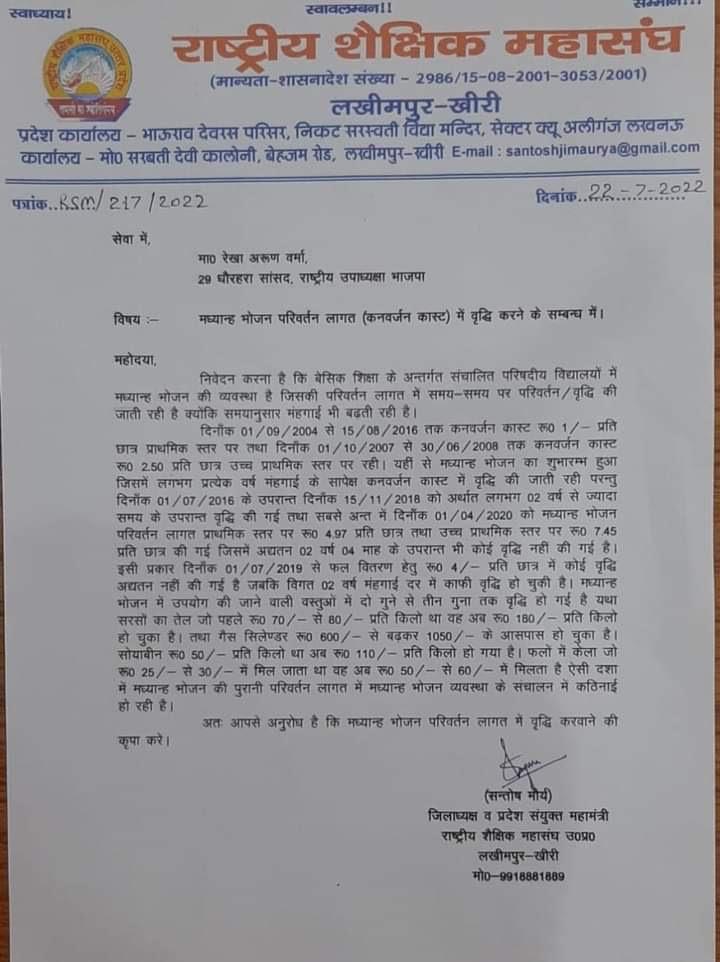
On July 22, Rashtriya Shaikshik Mahasangh wrote a letter to the BJP MP from Dhaurahra and the party vice-president, Rekha Arun Verma, to increase the conversion cost of MDM since inflation has skyrocketed and prices of edible oil, and LGP manifold.
From September 1, 2004, to August 15, 2016, the conversion cost was Rs 1 per student at the primary level and from October 1, 2007, to June 30, 2008, the conversion cost was Rs 2.50 per student at the upper primary level. After this, the conversion cost was increased almost every year relative to inflation. But from July 1, 2016, till December 15, 2018, conversion cost was not least increased not per inflation, the letter reads.
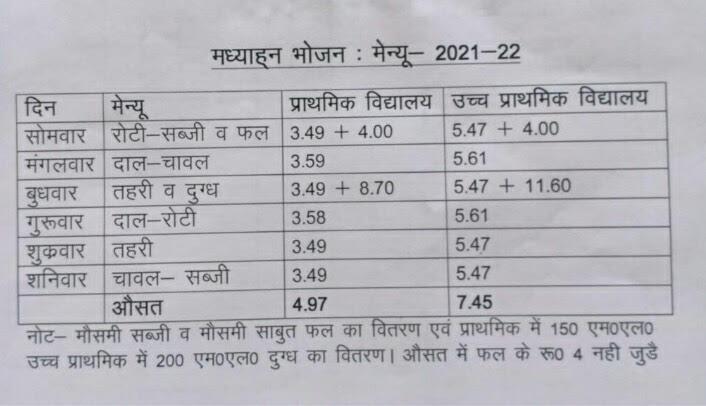
At last, the conversion cost was increased by the government on July 1, 2020, to Rs 4.97 per student at the primary level and Rs 7.45 per student at the upper primary level. In the last two and half years, not a single penny has increased even though the inflation rate has increased significantly over the last two years. The cost of the items used in mid-day meals has increased from two-fold to three-fold. For example, the cost of mustard oil, which was earlier Rs.70 to Rs.80 per kg, has now gone up to Rs.180 per kg. Similarly, the price of the gas cylinder has increased from Rs.600 to around Rs.1050, that for soybean has increased from Rs 50 per kg to Rs 110 per kg.
"Rs 4.97 is given per student for six days for food in which we have to give 150 ml milk every Wednesday to each student. If we split the milk cost, Rs 3.57 would be left for the food per student. Since the inflation is so high, edible oil, vegetables, milk, LPG and other ingredients being used for cooking food are expensive. How would we manage all this in just Rs 3.57?" questioned Santosh Maurya, in-charge headmaster of a government school in Chikwanpurwa under Ishanagar block in Lakhimpur Kheri distrcit.
Get the latest reports & analysis with people's perspective on Protests, movements & deep analytical videos, discussions of the current affairs in your Telegram app. Subscribe to NewsClick's Telegram channel & get Real-Time updates on stories, as they get published on our website.









